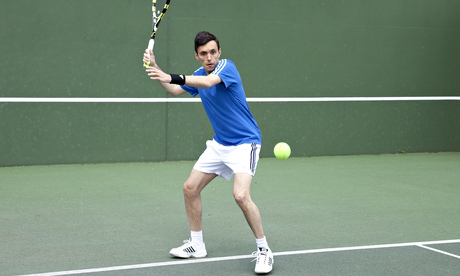
THE GOAL
As an average club player whose progress has stalled since I stopped being coached about a year ago, Zepp's pledge to "reveal your playing style and help identify ways to improve" was enticing. Although I can hit confidently on both sides, only my forehand can really damage opponents, so I was eager to see what the Zepp sensor – which "captures, measures and analyses your swing in three dimensions and records 1,000 data points a second" – had to say about my backhand.
THE METHOD
The 28x28mm sensor is in a rubber mount that stretches over the end of the racket handle. As you swing, it captures data and relays it via Bluetooth to an app on your phone. It's simple to set up and turn on, and after 15 minutes of hitting followed by an hour-long match I have my first data. I'm told that I hit 426 shots, with 64% forehand, 32% backhand and 4% serve, and was "active" for 20 minutes. The stats are displayed in a pie chart and clicking on forehand or backhand reveals the percentage that were hit flat, topspin or slice. I was surprised to find only 8% of my backhands had topspin, compared with 10% slice and 81% flat. Although there's nothing wrong with a flat backhand, topspin gives you greater margin for error, so it was useful to discover how few of my double-handers carry the desired spin.
The other thing Zepp measures is power, with a graph showing fluctuations in forehand, backhand, serve and smash during the session. Predictably, serve is identified as my most powerful stroke (I didn't hit any smashes) and backhand my tamest.
Of greater interest are the spikes and dips in power through the match. Thirty minutes in, I discover, I played a backhand as powerful as any serve. But without knowing the context in which the stroke was made (was it a simple put-away or a drive from the baseline?) or the end result (did I win the point? Did I net it? Did I hit it out of the park?), the data frustrates as much as it enlightens.
And this is the problem with Zepp: disconnected from knowledge of the rallying shots, unforced errors and outright winners that make up a point (not to mention the countless strokes when the ball is not actually in play), the data tells only a partial story.
THE VERDICT
There's a peculiar pleasure in poring over facts and figures about how you performed on court, and anyone who likes to hit the ball hard will relish the opportunity to compare their power levels with those of their opponent. But in its current incarnation, Zepp Tennis is essentially a means of indulging idle curiosity – a sophisticated way of confirming failings in your game you already knew existed.
Zepp can't tell the difference between a winner and a shank, a brilliantly constructed point and a rally of mis-hits. Until there's a way of recording the significance of each stroke, the data this app collects will be of limited value.

